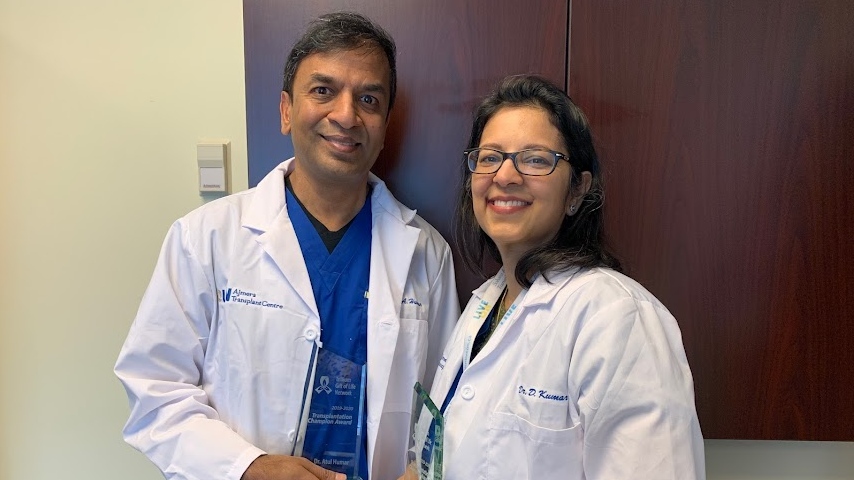Do transplant patients need a third vaccine dose? A new Toronto-based study has the answer
After two doses of the Moderna vaccine, Mike Willis said he had zero antibodies to combat COVID-19. More than five years ago, the 66-year-old received a heart transplant and has been immunocompromised ever since.
But now, after receiving a third dose of Moderna, he has developed some antibodies. “Some is definitely better than none,” Willis said.
Willis was one of 120 transplant patients enrolled in the first study in the country to determine that a vaccine booster is “very effective” in transplant patients, published on Wednesday in the New England Journal of Medicine.
“It’s really the first study that has really shown the benefit of third doses,” said Dr. Deepali Kumar, director of transplant infectious diseases at Toronto’s University Health Network and joint-senior author of the study with Dr. Atul Humar.
Previous research has found that transplant patients have an “undoubtedly” higher mortality rate due to COVID-19, compared to the general population. In essence, two doses was not enough to produce coronavirus-fighting antibodies.
This study was the first-in-the-world to conduct a randomized placebo-controlled trial on the subject — deemed the “gold standard” in medicine. The relevance of this highly-esteemed classification is it proves the results are conclusive and truly effective.
Patients were divided into groups, both had previously received two doses of a COVID-19 vaccine, but some received a third placebo dose, while others got a third dose of Moderna. After two doses of Moderna and one placebo dose, only 18 per cent of people had a sufficient antibody level that could combat the virus. The group that received a third dose of Moderna had a 55 per cent response rate.
“This is a highly significant number,” Dr. Kumar said.
 Dr. Deepali Kumar and Dr. Atul Humar are the joint-senior authors of a new study that shows the effectiveness of vaccine booster shots for transplant patients.
Dr. Deepali Kumar and Dr. Atul Humar are the joint-senior authors of a new study that shows the effectiveness of vaccine booster shots for transplant patients.
The study found the third dose only resulted in mild side effects and it did not cause organ rejection in transplant patients, which has been a significant concern in the transplant community.
Typically, studies of this nature would take at least a year, but Dr. Kumar’s team produced the results in a matter of months.
Now, she is asking policymakers to do the same, hoping for an expedited approval process for third doses for transplant patients. “We need to move rapidly,” she said. “With the Delta variant, I think we need to do whatever we can to protect immunocompromised patients.”
The study’s results have been shared with the Food and Drug Administration, the Canadian National Advisory Committee on Immunization and the American Society of Transplantation.
“It’s opening the door to a lot more than just third doses in transplant recipients,” Dr. Kumar said. “I think it’s opening the door to other immunocompromised groups as well.”
CTVNews.ca Top Stories

Walking pneumonia is surging in Canada. Is it peaking now?
CTVNews.ca spoke with various medical experts to find out the latest situation with the typically mild walking pneumonia in their area and whether parents should be worried.
Minister calls GST holiday, $250 cheques for 18 million Canadians 'a targeted approach'
Women and Gender Equality and Youth Minister Marci Ien is calling the federal government's proposed GST holiday and $250 rebate cheques a 'targeted approach' to address affordability concerns.
'Her shoe got sucked into the escalator': Toronto family warns of potential risk of wearing Crocs
A Toronto family is speaking out after their 10-year-old daughter's Crocs got stuck in an escalator, ripping the entire toe area of the clog off.
Ancient meets modern as a new subway in Greece showcases archeological treasures
Greece's second largest city, Thessaloniki, is getting a brand new subway system that will showcase archeological discoveries made during construction that held up the project for decades.
Quebec man, 81, gets prison sentence after admitting to killing wife with Alzheimer's disease
An 81-year-old Quebec man has been sentenced to prison after admitting to killing his wife with Alzheimer's disease.
Canada Post quarterly loss tops $300M as strike hits second week -- and rivals step in
Canada Post saw hundreds of millions of dollars drain out of its coffers last quarter, due largely to its dwindling share of the parcels market, while an ongoing strike continues to batter its bottom line.
'Immoral depravity': Two men convicted in case of frozen migrant family in Manitoba
A jury has found two men guilty on human smuggling charges in a case where a family from India froze to death in Manitoba while trying to walk across the Canada-U.S. border.
Prime Minister Trudeau attends Taylor Swift's Eras Tour in Toronto with family
Prime Minister Justin Trudeau is a Swiftie. His office confirmed to CTV News Toronto that he and members of his family are attending the penultimate show of Taylor Swift's 'The Eras Tour' in Toronto on Friday evening.
Trump supporters review-bomb B.C. floral shop by accident
A small business owner from B.C.'s Fraser Valley is speaking out after being review-bombed by confused supporters of U.S. president-elect Donald Trump this week.


































